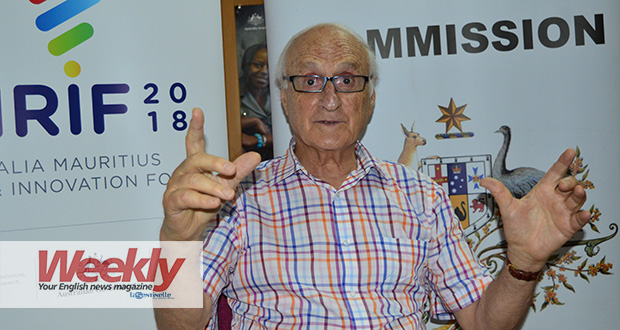Publicité
‘The research spotlight is turning to the impact of the intrauterine environment on future diabetes risk in adult life”
Par
Partager cet article
‘The research spotlight is turning to the impact of the intrauterine environment on future diabetes risk in adult life”


Weekly speaks to Paul Zimmet, professor of diabetes, Monash University, Melbourne, Australia, who was in Mauritius last week to participate in the Australia-Mauritius Research and Innovation Forum held on 19 February and to have follow up meetings with the Ministry of Health. He talks about the development of diabetes in the island and the focus of latest research.
You have been working with the Ministry of Health to track the evolution of diabetes for the last 30 years. What type of collaboration do you have with Mauritius?
My Australian team and I, along with other overseas colleagues, have been advising the Mauritius government on all major areas relating to diabetes and related chronic diseases, including treatment and prevention of diabetes and its complications since 1985. I have been involved in the regular studies of diabetes, obesity and heart disease over the 35 years. These studies have been in close collaboration with the Health Promotion team of the Ministry of Health and Quality of Life (MOH) and have put Mauritius on the international stage of diabetes research having one of the longest ongoing studies of diabetes and related diseases one of the longest monitoring studies of diabetes in the world.
And what are you currently working on?
Currently, I am working with the MOH team and other collaborators from Finland, the UK, Sweden and Australia on several new projects approved by Minister Husnoo.
Some of the projects aim at attacking diabetes and its complications. What progress has been achieved since your first visit to Mauritius?
I first visited Mauritius when I was director of the International Diabetes Institute in Melbourne, Australia, in 1982, when the Mauritius government had asked the World Health Organisation (WHO) to send a consultant as they were concerned at the apparent high rate of diabetes and heart disease. I advised that there should be a national study to confirm this but it was not until 1985 when I was asked to return to help plan a study. This took place as a collaborative study with the MOH in 1987. It was the first of a series — 1987, 1992, 1998, 2004, 2009 & 2015 involving my institute, the National Public Health Institute of Finland and the University of Newcastle, UK.
Mauritius is an interesting case study, isn’t it? What kind of things have you been able to predict?
Mauritius’ health patterns provide a mirror for the rest of the world. Because of its multi-ethnic population (Indian, Creole and Chinese), the results of health surveys and research discoveries are reflected in these ethnicities in other countries. So the surveys have benefited not only Mauritius but the rest of the world, particularly where these ethnic communities have migrated to. This is because the ethnic makeup of Mauritius is that of 66% of the rest of the world’s population. For example, we were able to predict the current epidemics of diabetes in China and India – diabetes was uncommon in China in 1980 yet now there are over 120 million people with diabetes.
What progress has been made in Mauritius in trying to check the progress of the disease?
It is important to note that there has been a levelling off in the rise in diabetes (68% between 1987 and 2009) from the results of the 2015 National survey and a reduction in smoking and obesity and an increase in physical activity. The battle against diabetes was never going to be an overnight success but the improvement in risk factors shows Mauritius is doing very well by world standards with its Health Promotion team but there is still much to do. Recent decisions have the potential to further enhance the work to reduce the personal and national burden of diabetes.
How do we rate as far as the disease is concerned?
Mauritius is doing better than many countries around the world. It is one of the few nations that has serial data to monitor the diabetes epidemic and then measure progress in its prevention activities.
The profile of diabetes in the community has been elevated by the activities of the MOH team and the Mauritius Diabetes Foundation (MDF), which has actively supported the MOH. Our collaborator Professor Alberti and I, as honorary presidents of the International Diabetes Federation (IDF), have successfully lobbied the IDF and a few months ago, the MDF was inducted as a full member of this major international organisation. This had been delayed because of some local pressure within Mauritius to prevent this happening. The recognition by the IDF clearly puts a focus on Mauritius and its activities to defeat diabetes and communicate the very good work of the Mauritius MOH to other nations.
Why is there such a high incidence of diabetes in Mauritius? Is it ethnicity, diet or are there other factors?
There is a contribution from these factors but this is not the full story. To prevent type 2 diabetes, we need a better understanding of the drivers of diabetes and the epidemic. While, for years, there has been comprehensive attention given to the “traditional” risk factors in Mauritius and other nations for type 2 diabetes i.e. familial genetic risk, lifestyle and behavioural change, the research spotlight is turning to the impact of the intrauterine environment on future risk in adult life. It highlights the urgency for discovering new approaches to prevention focusing on maternal and child health. Diabetes risk through in utero changes to the babies’ genetic translation can be transmitted inter-generationally, thus creating a vicious cycle that will continue to feed the diabetes epidemic.
Although aging, urbanisation, and associated lifestyle changes i.e. poor diet, and lack of exercise and obesity are thought to be the major causes for the rapid increase in diabetes in the community, an adverse intrauterine environment during pregnancy could also contribute in many developing countries. This possibility is of foremost importance for taking a longer-term view of defeating the diabetes epidemic in Mauritius. Poor pre-conception parental health (both mother and father) and an adverse womb environment significantly increase a baby’s risk of diabetes, heart disease, and mental health issues as an adult. This risk is intergenerational. Poor nutrition, alcohol and smoking during pregnancy are some of the critical risks that can trigger this. Therefore, it is essential the community ensures all Mauritian children get the best possible start in life. There is therefore a strong case for programmes to ensure good maternal and child health. Thus a child’s early development is critical for adult health in their later life.
Any future collaborations in the pipeline?
Mauritius is a mirror to the world in health — the multiethnic population is representative of the world population. Not only that, but also 2/3rds of the people in the world with diabetes live in developing nations. So what we do in Mauritius has immediate implications and is an example for these other nations.
The diabetes drugs being used currently are costly. Any solution to that?
They are very costly. So, we will use less expensive drugs that have been used for many years along with more intensive lifestyle to improve the blood sugar control of diabetes to reduce complications and the risk of death from heart attacks, strokes and kidney failure. If successful, it will be implemented widely in Mauritius.
Fighting a disease like diabetes also requires sanitisation, which in itself requires good communication. There hasn’t been much of that going on, has there?
We will start using social media, regular SMS messaging to convey healthy lifestyle habits in nutrition and exercise.
For more views and in-depth analysis of current issues, Weekly magazine (Price: Rs 25) or subscribe to Weekly for Rs110 a month. (Free delivery to your doorstep). Email us on: weekly@lexpress.mu
Publicité
Les plus récents






